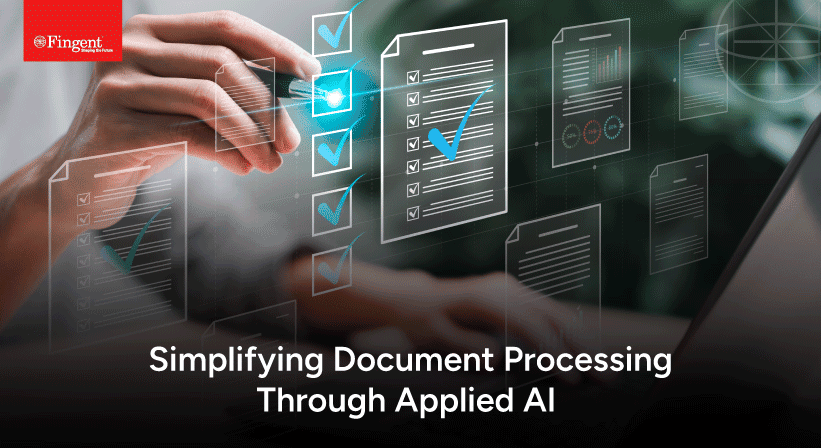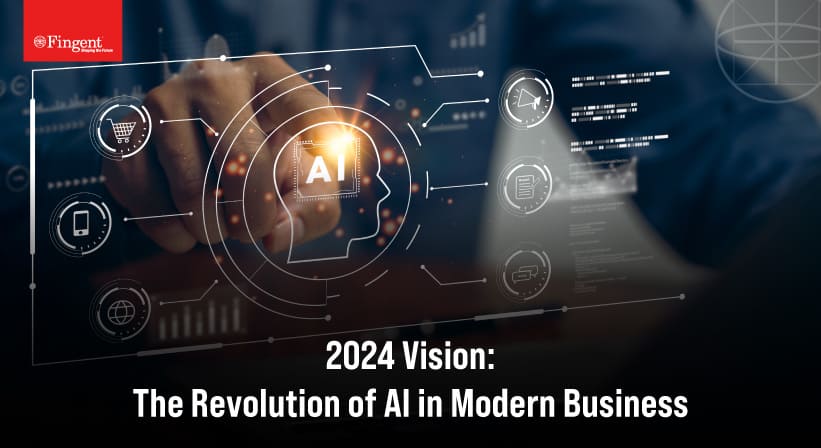Unconventional Ways Artificial Intelligence Drives Business Value
Artificial Intelligence is revolutionizing our lives. What used to conjure up images of robots taking over the world, is now a household word. Recommendation engines are reading our minds, virtual assistants are listening to our voices, and AI insights are transforming our businesses. AI is definitely here, and this blog will show you how.
Artificial Intelligence and Its Impact on Today’s World
Artificial Intelligence in its basic sense is defined as intelligence demonstrated by machines. In application, we can say that Artificial Intelligence is the ability of a machine to assimilate information and use it to make intelligent decisions. The attributes of problem-solving, decision making and other cognitive abilities that are associated with humans becomes artificial intelligence when applied to a machine.
The lifeblood of AI is data and its pulse run by an algorithm. Algorithms assimilate data and make sense of it through analysis. The resulting insight is what drives the decision making and problem-solving capabilities of Artificial Intelligence. Learning is by far the greatest attribute of Artificial Intelligence. The ability to learn and emulate human thinking and behavior is what makes AI nearly unstoppable. Its application in business is unmatched and is predicted to offer $15.7 trillion to the global economy by 2030!
Read more: AI Implementation For Businesses
Advanced Benefits of AI
The benefits of AI extend to much more than recommendation engines and chatbots. The ability of AI to make sense of data collected through the Internet of Things (IoT) will be a game changer in every aspect of our lives. Gartner predicts that 20.4 billion “things” will be connected by 2020. Artificial Intelligence can analyze the data collected by IoT technology and enable it in ways that we cannot even imagine.
A classic example of this is Idemandu, one of the most talked about topic in the AI world since the 2018 Consumer Electronics Show. In the words of its founder Pooya Abka, Idemandu is the first AI agent “that can understand customers’ service needs over voice, connect them to vetted service providers instantly, and learn about their personal preferences with time.”
Demonstrating what is possible with Idemandu, a Forbes article quotes this conversation:
You: “Hey Idemandu, could you ask my massage therapist to come to my place tonight preferably after 8? I’m feeling an annoying pain in my neck.”
Idemandu: “Sure, but your therapist is not available tonight. I found another very similar therapist who is available, would you like to see him at 8 pm tonight? If not, I can book your own therapist for tomorrow at 8:30 pm.”
You: “Okay, tell him to come tonight.”
Idemandu: “Okay, he’ll be there. I already briefed him about your pain.”
Imagine the possibilities with such an AI empowered assistant in every home and business. Google Duplex is another technology that is focused on helping us make hotel reservations. The Assistant will call your chosen restaurant, converse with the concierge, make a reservation for you, confirm with you if the reservation was successful or recommend another restaurant if it wasn’t!
The ability of AI and robotics to use concepts like AI-Augmented Contextual Analytics and Sentiment Analysis to better predict and direct customer experience was brought out in one of our recent blogs. You can read it here: https://www.fingent.com/blog/how-robotics-and-ai-can-improve-customer-experience-ctos-guide
How AI Is Transforming Various Business Sectors
The biggest impact of AI in business development. A survey conducted at the EmTech Digital conference revealed that respondents saw AI affecting these top three business outcomes:
- improve and/or develop new products and services
- achieve cost efficiencies and streamline business operations
- accelerate decision-making
We can see this impact in nearly every sector in business. Here are three sectors where the impact of AI has been seen the most:
Healthcare
86% of healthcare provider organizations, life science companies, and health technology vendors are using AI technology, says a 2016 report from CB Insights. These organizations are projected to spend an average of $54 million on AI projects by 2020. Few areas where AI is being used in healthcare are:
1) Data management – Medical records and other patient data can be accurately analyzed, stored and used to provide healthcare businesses with the right information at the right time. Time-intensive report analyses can be automated, diagnosis can be fast-tracked, and treatment can be better administered.
2) Virtual Consultation and Care – Healthcare apps using AI allow doctors, patients and, caregivers to communicate and coordinate effectively. Speech recognition, machine perception, and other AI enabled technologies, help to monitor the patient’s condition and administer effective treatment.
3) Precision Medicine and Drug Discovery – By screening complex compounds and existing medicines for specific attributes, drug candidates for pre-clinical drug discovery and development can be rapidly identified. AI can also help detect diseases and predict hereditary health issues more accurately and help design precision medicines for specific genetic make-ups.
For more applications of AI in the healthcare industry: https://www.fingent.com/blog/5-ways-big-data-is-changing-the-healthcare-industry
Finance
The assimilation and analysis of financial data is where AI shows its true potential, but there is much more that AI can do in the financial sector. AI in the Finance industry reduces costs, saves time and improves accuracy and efficiency in all areas of Finance. Here are a few applications:
- Security from Fraud – Security is the number one concern in the financial sector. AI helps in this by simulating fraud and cybercrime scenarios and coming up with preemptive security measures to combat security breaches. AI also helps in monitoring whether all security measures and regulations are being followed in the design of financial technology.
- Wealth Management – AI engines help analyze data associated with wealth management and provide insights on how to provide optimal benefits to clients. Creating personalized and tax-optimized investment offerings for clients becomes much simpler and accurate with the help of AI. AI also helps mitigate the unpredictability of the stock market, by incorporating features like blockchains and distributed ledgers.
- Digital Assistants – AI now assists with banking transactions and finance in nearly every household. AI assistants like Alexa, Siri and others are used to make financial transactions. Voice assisted banking is being made possible with banks like Barclays coming up with technology to enable money transfer through voice assistance software.
Read more about how predictive algorithms and AI will rule financial services: https://www.fingent.com/blog/how-predictive-algorithms-and-ai-will-rule-financial-services
Transportation
AI is being used widely in the transportation sector and these are a few areas where it is making an impact:
- Automation – While driverless cars are what comes to mind when we talk about AI and automation, the role of AI in automobile manufacturing is of equal import. Tesla’s automated manufacturing systems in its factories is an excellent example of the capabilities of AI in automobile manufacturing.
- Cloud based conveniences – With the help of AI and cloud computing, automobiles are being packed with features like suggestions for gas stations when the fuel is low, favorite restaurants on the route and shopping reminders when approaching stores.
- Intelligent Maintenance – Features like predictive maintenance, repair scheduling, and even sensors to detect medical emergencies for drivers can be enabled with AI.
Read more about how connected transportation will disrupt the world: https://www.fingent.com/blog/how-connected-transportation-will-disrupt-the-world
Keeping up with AI
As you can see, the implications for AI in business is tremendous. It is important that businesses capitalize on AI-based technologies to keep up with the competition. Fingent has helped businesses from every sector to implement AI and drive revenue. Drop us a message if you have any questions!
Stay up to date on what's new

Recommended Posts

20 Jun 2025
Creating MCP Servers for Building AI Agents
AI was once limited to internal pilots—impressive in demos, but rarely tied to measurable business outcomes. That’s changed. Today, AI systems are being integrated into workflows that impact decisions, operations,……

18 Apr 2024 B2B
Applied AI For Document Processing
"It's becoming increasingly clear that AI is the future, and almost everything else is a sideshow." - World-renowned computer scientist Geoff Hinton AI has taken over almost every aspect of……

10 Jan 2024 B2B
AI Trends Set to Transform Businesses in 2025
In the dynamic realm of modern business, the profound impact of artificial intelligence (AI) continues to unfold, reshaping industries and redefining conventional practices. As we step into 2025, the transformative……

26 Nov 2023 B2B
Finding Success in the Aviation Business with AI
“Aviation is the branch of engineering that is least forgiving of mistakes.” - Freeman Dyson, British-American theoretical physicist and mathematician. The truth in that statement is sobering indeed. The precision……
Featured Blogs
Stay up to date on
what's new




















































